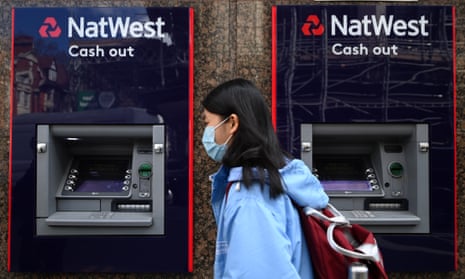The government has edged closer to exiting majority ownership of NatWest after selling a £1.1bn stake in the bank, which the taxpayer bailed out during the financial crisis more than a decade ago.
In a development authorised by the chancellor, Rishi Sunak, the Treasury said it had sold 580m shares at a price of 190p a share in a competitive overnight sale to City investors, cutting the government stake in the bank from 59.8% to 54.8%.
It brings the public stake in NatWest, formerly known as Royal Bank of Scotland, closer to minority ownership after years of stop-start attempts to return the bank to the private sector dating back to the government of David Cameron.
The disposal marks the government’s fourth sale of its NatWest shareholding since 2015, and its second transaction in two months.
“This sale represents further progress in the government’s plan to return institutions brought into public ownership as a result of the 2007-2008 financial crisis to private ownership,” the Treasury said.
The government also raised £1.1bn in March when NatWest agreed to buy 591m shares back from the government to accelerate reprivatisation, in an off-market deal authorised by Sunak.
The push to sell down the government stake comes as the chancellor seeks ways to combat record levels of public borrowing, after the exchequer racked up a £303bn deficit in the financial year ending in March amid the economic fallout from Covid-19.
The government bailed out RBS at the height of the 2008 financial crisis, injecting £45bn to keep the bank afloat in order to prevent an even worse meltdown in the banking system.
The taxpayer stake has been slowly reduced from 79% in 2015, when the then chancellor, George Osborne, launched the first disposal of shares at a loss of more than £1bn to the public. It comes despite pressure from campaigners and the former Labour leader Jeremy Corbyn to use public ownership of NatWest to create a network of state-owned regional banks.
Taxpayers are not expected to recover all of the money pumped into the bank, with the shares still worth less than half the price the government paid more than a decade ago. NatWest shares were down 2% on Tuesday at 193p.
Analysts expect NatWest to be fully returned to private ownership by 2025, almost two decades on from its effective nationalisation. Russ Mould, the investment director at the stockbroker AJ Bell, said: “In this case the bank will likely be pleased as it marks another step in the long rehabilitation of the group from the financial crisis.”
Although still far below the 502p price the government paid in 2008, shares in NatWest have more than doubled from a low of 90.5p in September, fuelled by rising optimism over the UK economy as pandemic restrictions are relaxed.
NatWest changed its name from RBS last year. The banking group still retains the RBS brand for its operations in Scotland, alongside NatWest in England and Ulster Bank in Northern Ireland. It recently reported a rise in first-quarter pretax profits to £946m, compared with £519m a year earlier.
Alison Rose, chief executive of the bank, said: “HM Treasury’s share sale represents another important step in returning NatWest to private ownership. It also reaffirms the strength of our investment case – a bank that champions the potential of people, families and businesses to build long-term value and drive sustainable returns for our shareholders.”
The sale was handled by four investment banks – Barclays, Citigroup, Goldman Sachs and Morgan Stanley – with advisers from NM Rothschild, in a process managed by UK Government Investments, the arm’s length body that controls the taxpayer stake on behalf of the Treasury.
